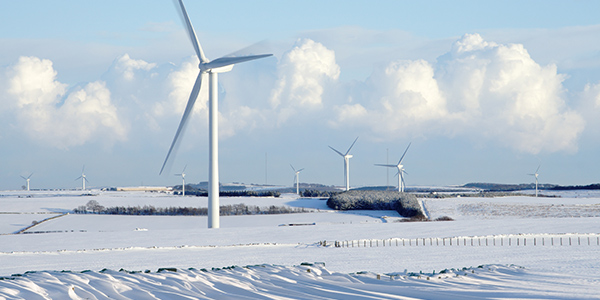NERC last week previewed several changes it is making to its Generating Unit Winter Weather Readiness guideline to ensure balancing authorities are aware of wind turbines’ low-temperature cutoffs.
The temperature at which a wind generator must shut down to avoid turbine blade damage can vary, Richard Hackman, NERC senior event analysis adviser, told attendees of a webinar on preparing for the coming winter. For sensitive components including lubricants and uninterruptible power supply (UPS) batteries, it generally ranges from -30 to -10 degrees Fahrenheit. The ERO now wants generators to keep their BAs advised of that cutoff before an expected “winter weather event,” along with any changes to availability, capacity or other operating limitations.
“Those things need to be known by balancing authorities so that they can take them into account,” Hackman said. “These things are expected to run under certain conditions, and if the weather forecast says it’s going to be too cold to operate those generators, people need to be able to plan on what they’re going to use instead. And that needs to be communicated well in advance.”
One attendee asked whether BAs should already know the low-temperature cutoffs for their wind units.
“You would hope that they do, but last time we ran into an issue with wind turbine cutoffs, the BA got a little bit surprised,” Hackman said. “Some of the wind generation owners were also surprised by the cutoffs. Apparently, they weren’t that familiar with them.”
He referenced the cold-weather event of January 2019, when MISO: Winter Emergency Another Signal for Grid Ops Change.)
NERC also added several “possible problem areas” that operators should check on their wind units before winter arrives:
- lube oil and greases, which have temperature limits themselves, for mechanical equipment;
- lead acid batteries or other UPS systems in exposed areas; and
- adequacy and functionality of heat tracing, insulation and temperature-responsive ventilation.
Hackman said the last item is “actually for everybody out there and not just the wind turbines. … [It] is one that should have been applied a long time ago.”
One other change to the document will also apply to all resource types: NERC is advising generators to “schedule any needed cold weather-related inspections, repairs and ‘winterization’ work” for before the National Oceanic and Atmospheric Administration’s first frost dates for their areas. NOAA defines this as the earliest possible date that an area will experience temperatures below 32 F. For parts of the Upper Midwest, this can be as early as Sept. 1. Similarly, the ERO wants generators to wait until after their last frost dates to begin undoing their winterization.
Other minor updates include replacing references to the old Operating, Planning and Critical Infrastructure committees with the new Reliability and Security Technical Committee, as well as a page of links to cold weather-related Lessons Learned reports.
Stakeholders have until Sept. 21 to comment on the changes.
NERC also previewed this year’s Winter Reliability Assessment during the webinar, though it did not have much new to report.
Reliability Assessment Engineer Stephen Coterillo said preliminary data indicate capacity resources will be adequate. Most NERC assessment areas’ reserve margins should be well above their reference levels, with only Manitoba and the Maritimes just barely under them.






